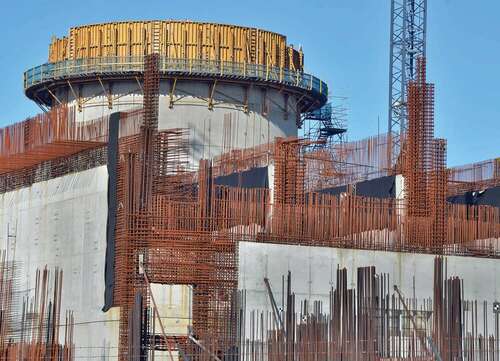
B.C. Premier David Eby uncommitted to any bailout of beleaguered North Shore wastewater treatment plant as feds ask for receipts for $3.1 billion cost overrun.
With provincial and federal governments presently uncommitted to a bailout, exactly how Metro Vancouver households will end up paying the $3.1-billion cost overrun for the North Shore wastewater treatment plant project will be subject to “in depth” debate among board directors in the coming months, says board chair George Harvie.
“That will be a subject of our discussion. I’m looking forward to it; I’m sure it will be very in depth and very serious discussion on this, but that would be up to the board as a whole,” said Harvie, the mayor of Delta.
On March 22, Metro Vancouver Commissioner Jerry Dobrovolny publicly revised the project costs to $3.86 billion — a five-fold increase of the $780-million estimate in 2017 when the building contract was awarded to Acciona.
Dobrovolny said the estimated cost to the “average” household in the North Shore’s three municipalities is $725 per year for the next 30 years. Taxpayers in other regions of the Lower Mainland will also have to pay more for the project, as well, in amounts ranging from $70 a year to $140 a year for 15 years.
Glacier Media asked Harvie is if the costs may be redistributed in some form.
“So, right now, that is current legal process for those costs. Again, it will be up to the board members, not the chair, whether or not they want to make a change,” said Harvie, referring to bylaws that dictate how local project costs are distributed through the regional district.
The board is in the budget planning phase this month and a special board meeting is scheduled April 17 “to hold a workshop-style discussion of Metro Vancouver’s budget preparations.”
The next board meeting is April 26.
The 2021 census shows 81,995 households in the City of North Vancouver, District of North Vancouver and West Vancouver combined. At $725 per year over 30 years, the regional district is addressing about $1.8 billion worth of costs (not accounting for growth). The remaining 1.02 million households paying about $105 annually for 15 years would account for about $1.6 billion. The provincial and federal governments have already provided about $400 million to the project.
Calling the cost escalation “quite incredible,” North Vancouver MP Jonathan Wilkinson said March 26 Metro Vancouver shouldn’t count on Ottawa to bail out the regional district.
B.C. Premier David Eby said April 2 the provincial government will wait to see the full financial reports of the plant project before making any decisions, likening his government’s response to that of the federal government.
“This infrastructure project is obviously a huge concern to Metro Vancouver taxpayers and I know to many Metro Vancouver directors as well. The federal government has indicated their expectation is Metro Vancouver provide an explanation about what’s going on before additional funds are flowed and the province is not in a different position from that. It needs to be clear what the issues have been and how they can be addressed going forward,” said Eby.
Harvie said April 2 he was waiting for a federal announcement on infrastructure funding and that afternoon Prime Minister Justin Trudeau announced the $6-billion Canada Housing Infrastructure Fund, for the entire country.
The wastewater treatment plant has been mired in delays and construction problems, such as deficient concrete, culminating in the termination of Acciona and legal proceedings between it and Metro Vancouver.
Harvie said project cost updates have been kept secret from the public until now due to that lawsuit, claiming “the handcuffs were on me because of litigation.”
Harvie said the project now needs to move along as fast as possible. He said costs continue to escalate and Metro Vancouver also has a projected a $10-billion project to rebuild the Iona wastewater treatment plant, serving Vancouver and Richmond.
“Right now, we need to set a budget and a budget that will ensure that this [North Shore] project can go ahead. We’re at a point now, the longer we wait, the more expensive it is going to get. Certainly, the lapse in time, including COVID, affected not only this project and many others; but it’s shocking numbers.”



